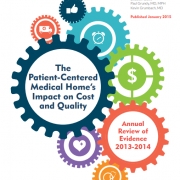You are looking at an archived version of our site. Please visit thepcc.org for a fresh, new experience!
Accountable Care Organizations (ACOs)
Accountable Care Organizations (ACOs)
ACOs are defined by the Center for Medicare and Medicaid Services (CMS) as groups of doctors, hospitals, and other health care providers, who come together voluntarily to give coordinated high-quality care to their Medicare patients. The goal of coodinated care is to ensure that patients get the right care at the right time, while avoiding unnecessary duplication of services and preventing medical errors.
When an ACO succeeds both in delivering high-quality care and spending health care dollars more wisely, the ACO will share in the savings it achieves for the Medicare program.
The PCC believes that primary care is the foundation of a successful ACO that uses transparent performance measures to achieve the Quadruple Aim of improving population health, improving patients' experience of care, reducing the total cost of care, and improving the work life of health care providers. In an ACO, strong primary care physician leadership of the care team is necessary to improve care coodination, and enhance preventitive care delivery.
For more information about ACO's visit the American Academy of Family Physicians (AAFP) website
Resources

The Commonwealth Fund | Agosto 2015

Annals of Family Medicine | Luglio 2015
This survey looks at how primary care physicians are compensated based on whether they are in ACO or non-ACO practices. Participation in ACOs was associated with significantly higher physician compensation for quality. This study helps to show how ACOs can be optimally structured for the highest-value.

The Patient-Centered Medical Home's Impact on Cost and Quality: Annual Review of Evidence, 2013-2014
Patient-Centered Primary Care Collaborative | Gennaio 2015

Bipartisan Policy Center | Maggio 2015

Cigna | Maggio 2015

JAMA | Maggio 2015
- ‹ precedente
- 4 di 18
- seguente ›
News
Ottobre 21, 2019 | Health Affairs Blog
Ottobre 8, 2019 | The Boston Globe
Settembre 30, 2019 | NAACOs
Settembre 11, 2019 | Health Affairs Blog
- ‹ precedente
- 4 di 54
- seguente ›
Events & Media
Ottobre 10, 2018 | Remedy Partners
Ottobre 29, 2018 | PCPCC
Ottobre 3, 2018
- ‹ precedente
- 4 di 30
- seguente ›
Related Content
Pagine
Pagine
Menu secondario
Copyright © 2024 Primary Care Collaborative













